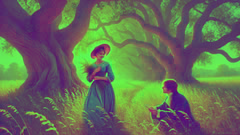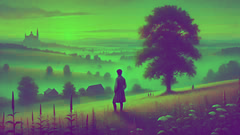Introduction
Mist rises from the gentle curves of the German countryside, curling above fields of golden rye and drifting into the lush green of ancient forests. It’s the dawn of a long summer in 1771, and in the village of Wahlheim, the world seems suspended between memory and promise. Here, a young man named Werther arrives, a satchel of letters tucked under his arm, his heart brimming with hope and yearning. He’s come from the city, seeking solace in nature’s embrace and in the simple joys of rural life. He’s an artist, and the world opens to him in color and sensation: the coolness of the morning air, the call of a distant cuckoo, the sparkle of dew on wildflowers. Each moment, for Werther, is an invitation to feel deeply. Yet beneath the surface of his delight lies a restless longing—a hunger for connection, for a beauty that transcends the fleetingness of each day. It’s this hunger that draws him to the village’s heart, where laughter spills from the inn and the church bells toll in the evenings. There, he finds friendship among the locals, who welcome his earnestness and gentle spirit. But it’s not until he encounters Charlotte, arranging wildflowers beneath the linden trees, that Werther’s life is truly upended. Her laughter is bright, her kindness effortless. Her presence, to Werther, is like sunlight in a shaded glade—illuminating, vital, impossible to ignore. Though she is betrothed to another, Albert, Werther’s feelings blossom into an aching, all-consuming passion. The world around him becomes a tapestry woven with moments of joy and torment: shared walks beneath the chestnut trees, stolen glances at evening gatherings, long nights spent wrestling with his devotion and despair. Through his eyes, we wander the valleys and meadows of a vanished Germany, feeling the pulse of first love and the agony of impossible desire. Each page is a portrait of longing, painted with words as vivid as any brushstroke, capturing the rapture and sorrow that define the young artist’s journey.
Arrival in Wahlheim: The Artist’s Heart Awakened
Werther’s first days in Wahlheim are bathed in a gentle haze of discovery. He rents a modest cottage at the edge of the village, its windows opening to the fragrance of orchards and the distant song of river birds. Each morning, he sketches beneath the linden trees, his hands stained with charcoal, his mind alive with impressions. He’s struck by the honest beauty of the villagers—their faces weathered but kind, their voices lilting with regional dialects that amuse and fascinate him. Children play along the lanes, women gather at the well with baskets of linen, and old men sit beneath eaves, pipes curling smoke into the air. Werther finds himself charmed by their stories, by their simple joys and sorrows.

On one such morning, as he attempts to capture the play of sunlight through the orchard leaves, he is interrupted by laughter—a sound so bright it seems to dissolve the last of his city-born anxieties. Charlotte stands before him, her arms full of wildflowers for her younger siblings, her cheeks flushed from the climb. She wears a plain blue dress and a straw bonnet tipped at a careless angle. As she offers him a shy greeting, Werther feels an unfamiliar warmth spreading through his chest. Her voice is clear and kind, her eyes alight with curiosity and humor.
The days that follow are a whirl of newfound friendship. Charlotte introduces Werther to the rhythms of village life: the weekly market, evening dances on the green, the slow gathering of storm clouds that signal a coming summer rain. She speaks with affection about her late mother, about her younger brothers and sisters whom she cares for with gentle authority. Werther is drawn to her devotion—to the way she listens to others with genuine attention, to the laughter she shares so freely, even when her own heart is heavy.
One evening, as twilight gathers and the world is tinted with lavender dusk, Werther walks with Charlotte along the banks of the river. The conversation drifts from art to poetry, from childhood dreams to the burdens of duty. A hush falls between them, thick with unspoken longing. Werther dares not reach for her hand, though every part of him aches to do so. The air is sweet with the scent of hay and honeysuckle, and Werther knows, even then, that his life has been divided: before Charlotte, and after.
It is at the village festival that Werther’s fate seems sealed. Lanterns swing from the branches of chestnut trees, their flickering light reflected in Charlotte’s eyes. As music plays and couples dance beneath the open sky, Werther watches Charlotte move through the crowd, always surrounded yet somehow alone. He can’t help but imagine a future where they might be together—where laughter and tenderness aren’t shadowed by duty or circumstance. But reality intrudes in the form of Albert, Charlotte’s fiancé, whose arrival is met with a mixture of admiration and silent despair. Albert is gentle, reliable, beloved by all. He welcomes Werther warmly, never suspecting the storm that rages beneath his friend’s calm exterior.
For Werther, each day becomes a struggle: between devotion and restraint, between the ecstasy of love and the agony of knowing it can’t be fulfilled. His art grows more intense, his letters more fevered. He finds himself walking for hours in the woods, searching for solace in the hush of trees or the cool rush of a hidden spring. Yet everywhere he turns, Charlotte’s image follows him—a constant, bittersweet companion.
Unraveling Joy: The Descent into Longing
As summer deepens, Werther’s days become a tapestry woven from moments of brilliance and quiet torment. He throws himself into his art, sketching the village at dawn, capturing children’s laughter, and trying to immortalize the way sunlight falls on Charlotte’s hair. Yet the more he tries to shape the world with his hands, the more he feels at its mercy. Each brushstroke becomes an act of both adoration and desperation.

Charlotte’s kindness never falters. She welcomes Werther into her circle, including him in walks, picnics by the river, and evenings spent reading poetry aloud. She laughs at his stories, listens to his philosophies, and sometimes, just sometimes, her gaze lingers on his face with a softness that quickens his pulse. But she never crosses the invisible boundary that her engagement to Albert has drawn. It’s a boundary Werther can’t help but test—subtly, then more recklessly—as his obsession grows.
Albert, for his part, is a model of patience and generosity. He takes Werther’s friendship at face value, confiding in him about hopes for the future, plans for a home with Charlotte, the weight of responsibility that comes with love. Albert’s trust is a gentle knife. Werther’s guilt sharpens with every shared secret and every unspoken wish. The three spend many evenings together, talking late into the night while the world outside slips into darkness. For Werther, these nights are at once a blessing and a curse: he is close to Charlotte, but not close enough; he is trusted, yet utterly alone.
As autumn approaches, the village’s colors shift from green to gold to rust. Werther’s restlessness grows. He wanders the fields in the early hours, searching for meaning in the changing light. Nature mirrors his turmoil: leaves spiral to the earth, storms break over distant hills, the river swells with rain. In his letters to his friend Wilhelm, Werther pours out his longing and despair, trying to make sense of emotions that threaten to consume him. He writes of nights spent pacing his room, haunted by memories of Charlotte’s laughter, of days when even beauty seems like a cruel joke.
The festival season brings both relief and agony. There are harvest dances beneath garlands of apples and wheat, feasts in candlelit barns, moments when Werther almost forgets himself in the press of warm bodies and cheerful music. But every joy is edged with pain. He watches Charlotte dance with Albert, her smile genuine but distant. He feels himself slipping from the world of ordinary happiness into a private realm of longing.
One evening, unable to bear it any longer, Werther confesses his feelings to Charlotte. They are alone in the orchard, the sun setting behind tangled branches. His words tumble out—clumsy, desperate, honest. Charlotte listens in silence, her eyes brimming with tears. She does not rebuke him, nor does she offer false hope. Instead, she asks him to remember her as she is now: a friend, a confidante, a heart already promised to another. The pain in her voice is as sharp as his own. That night, Werther sits alone beneath the linden trees, watching stars appear one by one. He realizes he can’t stay; his presence only brings suffering to them all.
With heavy heart, Werther leaves Wahlheim. He travels from town to town, seeking distraction in art and conversation, but nothing fills the emptiness. The memory of Charlotte haunts him—her voice, her laughter, the light in her eyes. Every new face is a pale reflection of hers; every landscape is tinged with longing. In a distant city, among strangers, Werther tries to forget. Yet his letters home are filled with regret, hope, and the ever-present ache of love unfulfilled.
Winter’s Shadow: Letters of Despair and the Final Choice
Winter settles over Germany with an unyielding grayness. The fields are shrouded in frost, and the forests stand silent beneath brittle branches. Werther’s letters to Wilhelm grow darker, his handwriting slanting and hurried as if the words themselves are too heavy to bear. He describes sleepless nights spent pacing cold rooms, the way Charlotte’s absence gnaws at him, turning every joy to ash. He tries to throw himself into study, into painting, into fleeting friendships with city acquaintances, but nothing cuts through the fog that has settled on his soul.

Occasionally, Werther receives news from Wahlheim: a letter from a child he befriended, a mention of Charlotte in a mutual friend’s correspondence. Each word is both balm and wound. He learns that Charlotte and Albert are married at last—a fact that brings him both relief (for her stability and happiness) and devastation. He returns to Wahlheim only once, under the pretense of visiting old friends, but finds himself unable to call upon Charlotte. Instead, he stands outside her house on a snowy evening, watching candlelight flicker in the window, hearing laughter muffled by distance. He leaves before dawn.
The world becomes smaller for Werther. His art loses its vibrancy; sketches pile up unfinished. Food tastes of nothing, music is hollow. He writes of standing at the edge of frozen lakes, watching his reflection blur in the icy water. He wonders whether anyone has ever felt so much and been able to do so little about it. His friends urge him to move on, to seek new company or new places, but Werther finds himself tethered to the memory of Charlotte by an invisible thread that will not snap.
Desperation breeds recklessness. Werther seeks solace in poetry and in drink; he spends hours wandering through wintry woods, talking to himself or scribbling in notebooks that grow more incoherent with each passing week. He becomes a figure of local gossip—a young man ruined by love, a cautionary tale whispered among the villagers.
One evening, after reading a favorite passage from Ossian aloud to himself—a passage about love and death—Werther makes a decision. He writes a final letter to Charlotte, pouring out his gratitude for the happiness she brought him, his sorrow for the pain he caused her, and his inability to continue in a world where hope has withered. He begs her forgiveness, asks her to remember him kindly, and encloses a lock of his hair as a keepsake.
That night, as snow falls softly outside his window, Werther arranges his possessions with care. He dresses in his finest clothes and places Charlotte’s letters beside him. As dawn breaks over the silent village, a single gunshot shatters the morning calm.
The news of Werther’s death spreads quickly through Wahlheim. Charlotte is inconsolable; Albert is shaken to his core. The villagers mourn the young man who brought color and light to their world, even as they struggle to understand the depths of his despair. In the quiet that follows, Werther’s memory becomes a kind of legend—a reminder of the power and peril of feeling too deeply.
Conclusion
In the wake of Werther’s death, Wahlheim feels both emptier and more alive. His story passes from lips to ears—first in whispers among the grieving, then as legend among those who never knew him. The linden trees under which he first met Charlotte become a quiet memorial, their roots entwined with the memory of love both bright and tragic. The villagers go about their lives, but something lingers: a sense that beauty and pain are forever entwined, that to feel deeply is both a gift and a risk. Charlotte visits Werther’s grave often in secret, leaving wildflowers as she did on that first day, her heart heavy with gratitude and regret. Albert stands beside her sometimes, silent and respectful, their shared sorrow drawing them together even as it reminds them of what can never be recovered. In time, new joys come to Wahlheim—marriages and births, harvests and festivals—but Werther’s presence remains, woven into the fabric of each dawn and dusk. His art survives him, fragile sketches tucked into the corners of friends’ houses, a testament to a heart that loved without limit. For those who knew him, and for those who only hear his story, Werther’s life stands as a testament to the fierce beauty of longing: proof that even sorrow can illuminate the world with a strange and lasting light.













